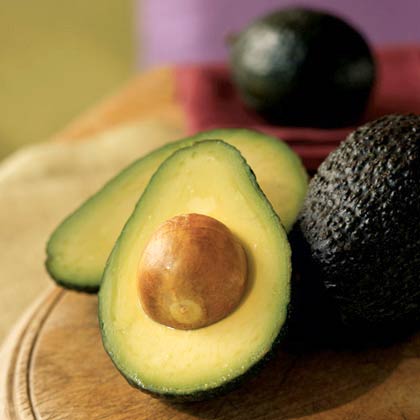I think that many health and fitness writers are pressured by their editors/publishers to come up with the “next” fad that they often get carried away and too absolute on what to eat or not eat.
Here are four foods that I think have gotten a bad reputation in the “diet world”, but that should actually have a place on your plate…
1. Peanut butter
Misconception: This creamy spread is an indulgence best enjoyed occasionally because it’s high in fat and calories.
Why it’s good for you:At least five major studies confirm that eating peanuts can lower risk for coronary heart disease. So it’s no leap to think that peanut butter confers the same benefits. “Suffice it to say that eating peanut butter or peanuts has been associated with lower total cholesterol, lower ldl or ‘bad’ cholesterol, and lower triglycerides, all of which are associated with lower cardiovascular disease risk,” says Richard Mattes, Ph.D., R.D., a professor of nutrition at Purdue University.
Even better, these health benefits seem to occur without also promoting weight gain. One reason could be that peanut butter is a stick-to-the-ribs kind of food. When Mattes offered a group of volunteers seven different snack foods (including peanut butter, rice cakes, pickles, and almonds), study participants reported that peanut butter or peanuts were much more filling snacks than rice cakes or pickles and tamed hunger for much longer. Sure, peanut butter is high in fat and calories, but if a small amount can quell hunger, that might explain why dieters seem more satisfied with weight-loss plans that include the spread.
But dieting or not, Mattes says a tablespoon or two of peanut butter is all it takes to net a world of benefits for both the heart and waistline. And don’t obsess about peanut butter being a source of trans fats. A study by the U.S. Department of Agriculture finds no detectable trans fats in a standard 2 tablespoon serving. CookingLight.com: Nutrition faceoff: Peanut butter vs. cream cheese
2. Eggs
Misconception: Eggs are high in dietary cholesterol, so they don’t have a place in my heart-healthy diet.
Why they’re good for you: Eggs contain a variety of substances that appear to promote good health. Choline, a nutrient that is critical to brain function, is one example. Eggs, it seems, are one of the richest food sources of choline. Scientists at the University of North Carolina find adding choline to the diets of pregnant animals improves memory performance in their offspring. It may seem like a leap to apply this finding to people, but researchers are already encouraging pregnant women to eat eggs and other choline-rich foods (such as beef liver) during pregnancy.
Eggs are also being studied because they contain lutein and zeaxanthin, antioxidants that may keep eyes healthy and ward off the leading cause of blindness, macular degeneration. A recent report in the Journal of Nutrition suggests that we look at the egg as a whole package: Eggs are inexpensive, contain the highest-quality protein on the planet, and are loaded with small amounts of vital nutrients, including folate, riboflavin, selenium, B12, and choline. At 75 calories apiece, eggs are also a nutrient-dense food that makes a smart and low-calorie contribution to any menu.
3. Avocado
Misconception: I shouldn’t eat avocados because they’re high in fat.
Why they’re good for you: A lot of attention centers on the fact that avocados are rich in monounsaturated fat, the heart-healthy kind. Yet scientists are now more interested in the active compounds in avocados that might help prevent cancer. One recent study found that those compounds can inhibit the growth of prostate cancer cells in the laboratory. While conducting the study, these researchers found avocados are loaded with a variety of antioxidants, including familiar disease-fighting compounds such as lutein, beta-carotene, and vitamin E.
Another recently discovered benefit is that avocados help the body absorb phytochemicals from other foods. Researchers from Ohio State University recently reported that pairing avocados with salsa or salad allows for better absorption of antioxidants in those foods. The lycopene in tomatoes or the beta-carotene in carrots may be better absorbed if there’s a slice or two of avocado in the bowl. Scientists suspect that the fat content of avocados helps the body absorb these antioxidants. CookingLight.com: Good fats vs. bad fats
4. Mushrooms
Misconception: Mushrooms are a low-calorie food with little nutritional benefit.
Why they’re good for you: They may be 90 percent water and have only 18 calories per cup, but mushrooms are getting serious scientific attention. Laboratory reports and animal studies show that compounds in mushrooms may do everything from bolster immune function to suppress breast and prostate cancers to decrease tumor size. And now, Penn State researchers find that mushrooms, from the humble button to the giant portobello, harbor large amounts of an antioxidant called L-ergothioneine. The scientific buzz is that fungi, for the moment, are the only foods that contain this compound.
While scientists work to figure out how these findings will translate to dietary advice, there are plenty of reasons to enjoy mushrooms. Clare Hasler, Ph.D., a well-known expert in functional foods and executive director of the Robert Mondavi Institute for Wine and Food Science at the University of California, Davis, points out that mushrooms offer a healthy helping of the blood pressure– lowering mineral potassium. “Most people might be surprised to learn that while orange juice is touted as one of the highest potassium foods, one medium portobello mushroom actually has more potassium,” she says. “And five white button mushrooms have more potassium than an orange.”
This list is excerpted from Cooking Light magazine. By Maureen Callahan.


